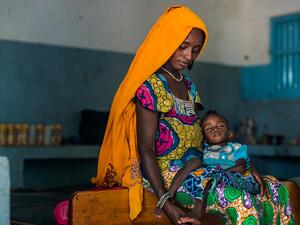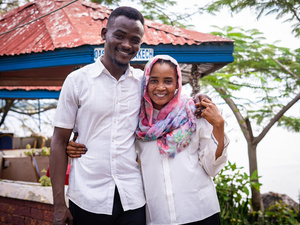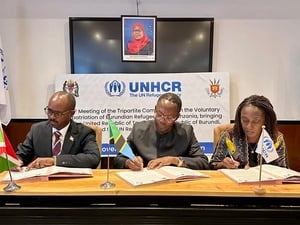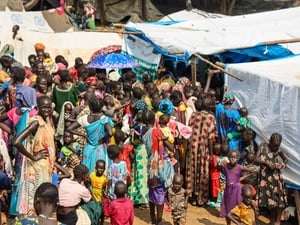Rising violence drives refugees from Burkina Faso to neighbouring countries
Rising violence drives refugees from Burkina Faso to neighbouring countries

Kalizeta Sawadogo, a mother of 3, fled her village in northern Burkina Faso because of attacks by non-state armed groups. She found refuge in Sikolo, in northern Côte d'Ivoire.
Kalizeta, 35, worked as a nursing assistant in the local hospital. Fearing for her safety, she decided to flee to the capital city, Ouagadougou, but later headed south to the border with Côte d'Ivoire and crossed to the town of Sikolo. “I couldn't stay in Ouagadougou because I had no one there. Life is expensive. That's why we came here. I hope to find work,” she said.
The security situation in Burkina Faso has deteriorated dramatically in recent months, with an increase in attacks on civilians and widespread human rights violations by non-state armed groups. Since November 2022, more than 60,000 Burkinabe asylum-seekers have fled to neighbouring coastal countries including Côte d'Ivoire, Togo, Ghana, and Benin.
The new influx of refugees is putting additional pressure on the already stretched resources of host countries and communities, which were already struggling with high levels of poverty and the growing impacts of climate change.
When the armed groups came, everything changed.
“We draw water from the market pump. We go there in the morning, and we don't get back before 2 p.m. because there are many people and we have to wait our turn,” said Kalizeta.
“I felt at home in Burkina Faso, I was in a good house, I slept peacefully, I ate my fill. But when armed groups came, everything [changed],” she added. “We couldn't even cultivate our fields; the harassment was constant. If everything goes well in Côte d'Ivoire, I will not go back to Burkina Faso.”
Most of the people fleeing are women and children, many of whom have been exposed to gender-based violence and have suffered psychological trauma.
Koné Minata, 44, fled with her six children to Côte d'Ivoire. They used a motorcycle to cross the border in groups of two to avoid detection by armed groups. “Sometimes they would catch a neighbour and kill him after interrogation. Do you think we wanted to stay there after that? That's why we fled,” she said.
In addition to the 92,000 Burkinabe refugees now living in six neighbouring countries, the rampant violence has displaced more than 2 million people inside the country’s borders. The widespread insecurity is also exacerbating food shortages, with the UN predicting that 3.3 million people will face acute food insecurity in the coming months.
Meanwhile, those who have fled across borders are unsure when – or if – they will be able to return.
“We manage the best we can. It hurts me to live like this when I used to live quietly at home and enjoyed my freedom, but now we are crowded here,” said Minata. “If the situation improves, I will be happy, but I will not go back because of the way I saw them killing people.”
Support to host communities essential
In response to the rising displacement, UNHCR, the UN Refugee Agency, is scaling up its presence in host countries to support governments and local communities in collaboration with other humanitarian actors.
UNHCR is encouraging efforts by host countries to keep borders open, register new asylum-seekers, and support hosting communities.
In Côte d'Ivoire, the agency is working with the authorities to relocate refugees on a voluntary basis from border villages to two new sites currently under construction in Bounkanj and Tchologo regions.
“We continue to receive new arrivals from Burkina Faso almost daily,” said Rokya Diakite, UNHCR’s senior protection officer in Côte d’Ivoire. “These arrivals in the north of Côte d’Ivoire are fleeing persecution. We commend the Ivorian government for keeping the border open.
“We are working with the government and other partners to ensure that the rights of refugees are protected. Biometric registration of new arrivals is continuing, for which we are grateful for the financial support of the US government.”
In Togo, the authorities are conducting the registration of refugees from Burkina Faso with the support of UNHCR. The agency is also advocating with host governments in the region to prioritize community support for refugees from Burkina Faso, to ensure long-term protection and facilitate the search for durable solutions.
“This community support approach aims to enable host areas to absorb the influx by supporting existing services such as schools, health-care facilities, and water, sanitation, and hygiene,” UNHCR’s Diakite explained.
Meanwhile, Minata said she hopes that her children can resume their education in Côte d'Ivoire which, like other countries in the region, has a long-standing policy of including refugee children in the national education system.









